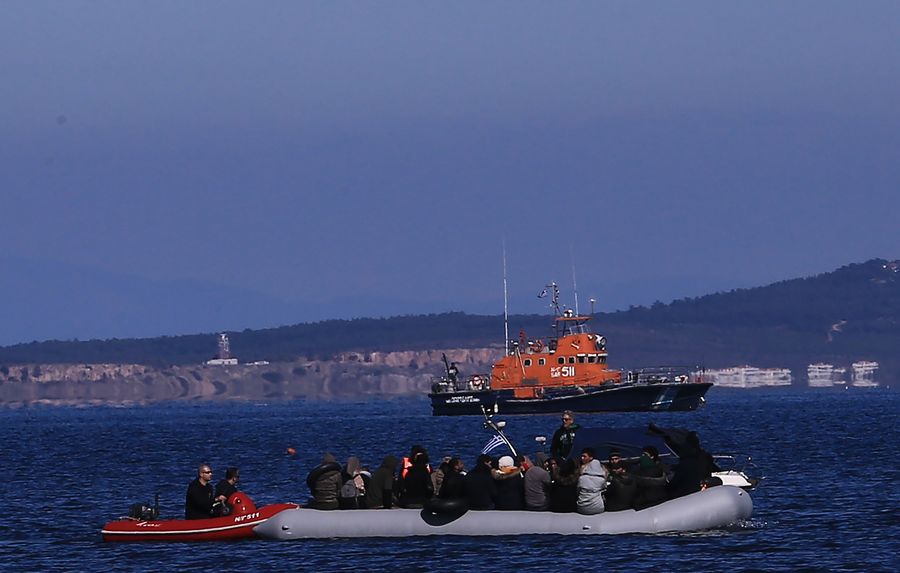
A boat full of refugees from Turkey approaches the port of Thermi, on the island of Lesvos, Greece, on March 1
MYTILENE (Greece), March 2 (NNN-Xinhua) — Greece decided to increase the level of deterrence at its borders to the maximum, as the country is facing a forthcoming increased refugee and migrant influx recently.
The Greek government also criticized Turkey for allegedly “directing and encouraging” the increased refugee and migrant flows to its borders in the past few days.
“This movement is directed and encouraged by Turkey. These actions are taking place in violation of its obligations under the EU-Turkey joint statement,” Greek government spokesperson Stelios Petsas said on Sunday night after a meeting of the Government Council for National Security, referring to the agreement launched in 2016 aimed to stem the refugee and migrant influx.
The council took the decision to increase the level of deterrence at Greece’s borders to the maximum, Greek Prime Minister Kyriakos Mitsotakis tweeted, announcing that on Tuesday he will visit Evros land border in the north with European Council President Charles Michel.
“The borders of Greece are the external borders of Europe. We will protect them…” the prime minister said.
In Sunday’s meeting, it was also decided that from now on Greece will not be accepting any new asylum applications for one month by people entering the country illegally and will be immediately returned to their country of origin if possible, spokesperson Petsas announced.
In addition, Greece was formally requesting European Border and Coast Guard Agency’s (Frontex) increased presence in the region and EU’s full support to Greece with concrete measures, the spokesperson said.
More than 13,000 people have gathered at the land border between Greece and Turkey, according to International Organization for Migration, after Ankara’s message in the past few days that Turkish authorities can no longer prevent people from reaching Europe’s borders.
For a third consecutive day, on Sunday, Greek police and army forces guarded the land border, briefly clashing with groups of people attempting to cross the borderline, Greek national news agency AMNA reported.
The Greek Foreign Ministry tweeted Sunday that some 10,000 people were “prevented from entering Greek territory (all along Evros) from yesterday morning to this morning.”
“No one can cross the Greek borders. All those attempting illegal entry, are effectively prevented from entering,” read a second tweet.
At least six inflatable dinghies with 300 refugees and migrants landed on the shores of Lesbos and another 200 in two other islands on Sunday, according to AMNA.
In at least one case on Lesbos, groups of locals prevented their disembarkation and Coast Guard vessels transferred the people to another site.
Other groups of islanders blocked the streets to Moria, Lesbos’ refugee camp which currently hosts about 19,400 people, while its capacity is about 2,800, according to official data provided by Greece’s Citizen Protection ministry.
More than 42,000 refugees and migrants are currently on five Greek islands in reception facilities which have been overflowing for months, according to the figures provided by the Greek government.
Locals request the central government to transfer part of them to the mainland, protesting that local communities can no longer shoulder the disproportionate burden.
More than one million people reached Greece, with about half landing on Lesvos, since 2015. Most continued their journey to other European countries until the closure of borders along the Balkan route in the winter of 2016. — NNN-AGENCIES





